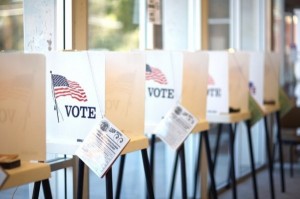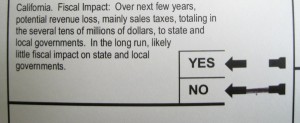Apart from voting, I sat out this election. I didn’t argue with anyone about it. I stayed off of Facebook and Twitter. I spent zero time fundraising, phone banking, canvassing, convincing family members in swing states to go to the polls, writing articles, or forwarding chain emails. I had a very good reason. I always believed that one candidate was grossly unqualified to be president, and the other was a corrupt, rotten, politically feckless prevaricator, and it was not always clear which was which.
 But I won’t deny I spent many hours obsessively checking FiveThirtyEight and Politico for minute movements in the polls. I secretly hoped Hillary Clinton would be our next president. Not because of any love for Hillary Clinton, but because of my love of the Republic and the long-standing political norms which are now threatened with collapse under a wannabe strongman with authoritarian tendencies.
But I won’t deny I spent many hours obsessively checking FiveThirtyEight and Politico for minute movements in the polls. I secretly hoped Hillary Clinton would be our next president. Not because of any love for Hillary Clinton, but because of my love of the Republic and the long-standing political norms which are now threatened with collapse under a wannabe strongman with authoritarian tendencies.
I thought she would win. The media though she would win. The pollsters thought she would win. All but one of my friends thought she would win. Benjamin Franklin Elementary School thought she would win. Dixville Notch thought she would win. The global financial markets thought she would win. Trump’s advisors thought she would win. Trump himself probably thought she would win.
We were wrong.
We were wrong because we are all ignorant.
We were wrong because we didn’t think about the people in the heartland.
We were wrong because we spent months insulting those people and their concerns, instead of taking them seriously.
We were wrong because we thought that policy or reason or social norms would dictate the outcome, not economic malaise, uncertainty or stress.
We were wrong because we don’t have any friends or colleagues or internet connections outside of our own bubble.
We were wrong because we think that personality, character, or qualifications should matter more than branding, charisma, and confidence.
We were wrong because we thought this was a historical moment, but we had a misguided view of history.
We were wrong because we spent all this time talking about the 1%, and it turns out that we were the 1% that America was really concerned about.
We were wrong because we listened to the media, and the media listened to us, and no one listened to the voters.
A couple people were right. Michael Moore was right (and I hate myself for linking to his website and giving it any legitimacy, I really do). Nate Silver was right, that Trump had a legitimate chance of becoming president due to polling uncertainty. Peter Thiel was right. One of my best friends I alluded to above was right from the first day Trump announced his candidacy. I called him last night to ‘concede.’ He told me: “Trump hit a nerve. Everyone who was paying attention saw it. But no one wanted to see it.”
If Brexit and this election teach us anything, it’s that the people in democracies really are sovereign. And their voice matters more than the “experts,” the “elites,” the “establishment,” or any other word you can slap on the bubble of those of us who are fortunate enough to be economically secure.
We owe an apology to the 59 million Americans who thought differently. Not because they won–they could still be wrong. Their reasons may be malevolent. Their beliefs may be crazy. They could still be the caricature of ‘middle aged white America’ that everyone seems so intent on blaming.
But we owe them an apology because we didn’t take them seriously. They have had their character questioned, their intelligence insulted, their concerns dismissed, their beliefs maligned, the worst about their intentions assumed. More importantly, many of them have had their incomes reduced, their jobs outsourced, their cost of healthcare increased, and their economic opportunities curtailed.
Clinton made a lot of mistakes in this election. Most notably, she didn’t visit Wisconsin once. If that doesn’t speak to the very arrogance that defines the concerns of everyday Americans with the elite, I don’t know what does.
Trump is the least humble man in America. But he has singlehandedly brought thundering humility and shame upon the entire elite class: the media, academia, the Republican Party, the Democratic Party, career politicians, lobbyists, Wall Street, the military brass, Silicon Valley.
We need these institutions now more than ever. If we have any hope of keeping Trump’s maniacal thirst for power in check, we need these institutions to stand up to him. We need them to brush themselves off and get back to the serious work of holding those in power accountable. Because Trump isn’t an outsider barking at the fringes anymore. He has a mandate from the American people to rule, with the full force and power of the United States legislative and executive branches behind him, with the judicial sure to follow.
Trump isn’t going away. This is just the beginning.
 However, in practice, this seems like an exercise in futility. For one thing, the guides themselves are dense manuals that number at more than 150 pages each; a chore to read cover-to-cover for any person. Each ballot proposition (there are eleven of them) is painstakingly deconstructed and explained, no doubt by committee, and the “For” and “Against” arguments are provided by representatives from each side–these representatives are also, no doubt, chosen by committee. The result is a sanitized, extremely confusing, mishmash of populism, legalize, and financial voodoo that seems to make both sides of each proposition look like the other side is an Orwellian nightmare and the alternative is the only solution to California budget Nirvana.
However, in practice, this seems like an exercise in futility. For one thing, the guides themselves are dense manuals that number at more than 150 pages each; a chore to read cover-to-cover for any person. Each ballot proposition (there are eleven of them) is painstakingly deconstructed and explained, no doubt by committee, and the “For” and “Against” arguments are provided by representatives from each side–these representatives are also, no doubt, chosen by committee. The result is a sanitized, extremely confusing, mishmash of populism, legalize, and financial voodoo that seems to make both sides of each proposition look like the other side is an Orwellian nightmare and the alternative is the only solution to California budget Nirvana. Finally, some of these measures are straight wrong, or just illegal. City Proposition G reads as follows: “In Citizens United v. Federal Elections Commission, the U.S. Supreme Court ruled that the free speech provision of the First Amendment protects corporations as well as human beings…Proposition G would make it City policy that corporations should not have the same constitutional rights as human beings and should be subject to political spending limits.” Put simply, a city ordinance cannot take away federal constitutional rights. If Biloxi, Mississippi were to pass an ordinance that said “In Roe v. Wade, the U.S. Supreme Court ruled that women have a constitutional right to an abortion…Proposition A would make it City policy that women not have a constitutional right to an abortion,” people would be up in arms, and rightfully so. The City of San Francisco doesn’t decide what is constitutional, especially after it has already been ruled constitutional. Even the
Finally, some of these measures are straight wrong, or just illegal. City Proposition G reads as follows: “In Citizens United v. Federal Elections Commission, the U.S. Supreme Court ruled that the free speech provision of the First Amendment protects corporations as well as human beings…Proposition G would make it City policy that corporations should not have the same constitutional rights as human beings and should be subject to political spending limits.” Put simply, a city ordinance cannot take away federal constitutional rights. If Biloxi, Mississippi were to pass an ordinance that said “In Roe v. Wade, the U.S. Supreme Court ruled that women have a constitutional right to an abortion…Proposition A would make it City policy that women not have a constitutional right to an abortion,” people would be up in arms, and rightfully so. The City of San Francisco doesn’t decide what is constitutional, especially after it has already been ruled constitutional. Even the 